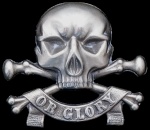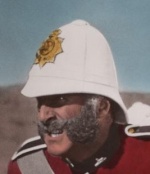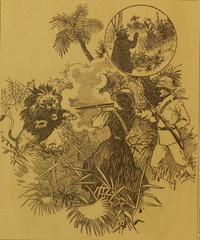| Latest topics | » The Pictorial World - March 15th 1879 Yesterday at 1:13 pm by ben2000 » The lost diary of Pvt James Owen Thu Jul 25, 2024 12:03 pm by miklew » Last of the 24th at Isandhlwana Wed Jul 24, 2024 6:16 pm by John Young » What was the uniform of field marshals/generals in the zulu war? Mon Jul 22, 2024 6:53 am by John Young » Henderson and the NNH at Rorke's Drift  Sat Jul 20, 2024 12:17 pm by SRB1965 » Capt. D. Hayes 1/3rd Regt., NNC Thu Jul 18, 2024 11:11 am by Julian Whybra » The Wrecked Camp Wed Jul 17, 2024 4:33 pm by Julian Whybra » Private N/N John Robert Branch 90th Regiment and his discovered diary Mon Jul 15, 2024 8:53 pm by 1879graves » Private John Scott 24th Regiment a fugitive at large Sun Jul 14, 2024 12:06 pm by 1879graves » 90th foot sgt T. Collins 214 Sun Jul 14, 2024 10:57 am by johnman » Baron Von Steitencron Wed Jul 10, 2024 3:10 pm by Julian Whybra » Sgt Joseph Windridge, Defender of Rorke's Drift - Memorial Tue Jul 09, 2024 3:15 am by 90th » Writing advice Sun Jul 07, 2024 4:04 pm by Julian Whybra » South Africa 1877-79, 1 clasp, 1877-8-9 (4389 Fr. Sergt. S. Smith. O/2. Bde. R.A.) Sun Jul 07, 2024 9:30 am by rai » The trashing of the Zulu monument to the brave warriors at Isandlawana March 12, 2024 has been blamed on scrap metal scavengers. Thu Jul 04, 2024 7:41 pm by ADMIN» The Goodwill Zulu Festival: Celebrating the Welsh and KwaZulu Natal Shared Heritage. Thu Jul 04, 2024 7:27 pm by ADMIN» Any nominal role of G Coy 2/24th regiment  Thu Jul 04, 2024 11:18 am by Wayne » Bassage Diary Thu Jul 04, 2024 9:31 am by Julian Whybra » Prior to Sihayo's Kraal  Thu Jul 04, 2024 9:19 am by 90th » British Fort Locations Thu Jul 04, 2024 3:40 am by 90th » Sergeant 1064 Tom Hick / Hicks G Company 2/24th Regiment Wed Jul 03, 2024 11:05 am by Julian Whybra » A Hungarian soldier in the Zulu War (?) Fri Jun 28, 2024 2:31 pm by Mr M. Cooper » Private 25B/279 Henry Sears Bugler E Company 24th Reg. KIA Isandlwana Thu Jun 27, 2024 1:07 pm by gardner1879 » Hamilton Browne's birthday Fri Jun 21, 2024 9:22 am by Julian Whybra » Zulu "Corps" Thu Jun 20, 2024 6:01 pm by Hobbes » Army Pay Department Personnel Thu Jun 20, 2024 11:49 am by Julian Whybra » Ntshingwayo birth date Sun Jun 16, 2024 11:37 am by Hobbes » Zibhebhu and Cetshwayo's family Wed Jun 05, 2024 9:11 pm by Julian Whybra » Smith's Store/Hotel Wed Jun 05, 2024 6:06 pm by Julian Whybra » Corporal James Frowen Williams F Company.  Tue Jun 04, 2024 5:20 pm by Julian Whybra » Shaka iLembe Sat Jun 01, 2024 1:27 pm by Jon84 » Bugler 1415 Thomas Finn / Flin 90th Regiment  Sat May 25, 2024 11:28 am by johnman » Inspector-General Evelyn Richard Hugh Pollard Tue May 14, 2024 10:13 am by ADMIN» Alfred Fairlie Henderson photographs. Sat May 11, 2024 8:01 am by Julian Whybra » Fairlie's Native Police Thu May 02, 2024 9:12 pm by Hobbes |
| July 2024 | | Mon | Tue | Wed | Thu | Fri | Sat | Sun |
|---|
| 1 | 2 | 3 | 4 | 5 | 6 | 7 | | 8 | 9 | 10 | 11 | 12 | 13 | 14 | | 15 | 16 | 17 | 18 | 19 | 20 | 21 | | 22 | 23 | 24 | 25 | 26 | 27 | 28 | | 29 | 30 | 31 | | | | |  Calendar Calendar |
|
| Top posting users this month | |
| New topics | » The Pictorial World - March 15th 1879 Yesterday at 1:13 pm by ben2000 » The lost diary of Pvt James Owen Thu Jul 25, 2024 12:03 pm by miklew » Last of the 24th at Isandhlwana Wed Jul 24, 2024 5:53 pm by miklew » What was the uniform of field marshals/generals in the zulu war? Sun Jul 21, 2024 12:30 pm by darthvaix » Henderson and the NNH at Rorke's Drift  Fri Jul 19, 2024 1:29 pm by SRB1965 » Capt. D. Hayes 1/3rd Regt., NNC Wed Jul 17, 2024 10:52 pm by Julian Whybra » The Wrecked Camp Sun Jul 14, 2024 8:51 am by 61MECH » The trashing of the Zulu monument to the brave warriors at Isandlawana March 12, 2024 has been blamed on scrap metal scavengers. Thu Jul 04, 2024 7:41 pm by ADMIN» The Goodwill Zulu Festival: Celebrating the Welsh and KwaZulu Natal Shared Heritage. Thu Jul 04, 2024 7:27 pm by ADMIN |
| Zero tolerance to harassment and bullying. | |
Due to recent events on this forum, we have now imposed a zero tolerance to harassment and bullying. All reports will be treated seriously, and will lead to a permanent ban of both membership and IP address.
Any member blatantly corresponding in a deliberate and provoking manner will be removed from the forum as quickly as possible after the event.
If any members are being harassed behind the scenes PM facility by any member/s here at 1879zuluwar.com please do not hesitate to forward the offending text.
We are all here to communicate and enjoy the various discussions and information on the Anglo Zulu War of 1879. Opinions will vary, you will agree and disagree with one another, we will have debates, and so it goes.
There is no excuse for harassment or bullying of anyone by another person on this site.
The above applies to the main frame areas of the forum.
The ring which is the last section on the forum, is available to those members who wish to partake in slagging matches. That section cannot be viewed by guests and only viewed by members that wish to do so. |
| Fair Use Notice | | Fair use notice.
This website may contain copyrighted material the use of which has not been specifically authorised by the copyright owner.
We are making such material and images are available in our efforts to advance the understanding of the “Anglo Zulu War of 1879. For educational & recreational purposes.
We believe this constitutes a 'fair use' of any such copyrighted material, as provided for in UK copyright law. The information is purely for educational and research purposes only. No profit is made from any part of this website.
If you hold the copyright on any material on the site, or material refers to you, and you would like it to be removed, please let us know and we will work with you to reach a resolution. |
| | | Colonel. Davies, H.F. |  |
| | | Author | Message |
|---|
littlehand

Posts : 7076
Join date : 2009-04-24
Age : 55
Location : Down South.
 |  Subject: Colonel. Davies, H.F. Subject: Colonel. Davies, H.F.  Wed Feb 24, 2010 7:56 pm Wed Feb 24, 2010 7:56 pm | |
| Colonel. Davies, H.F. Gren. Gds. Proceeded to the Cape in March 1879, in command of drafts for the 24th Regt. Served in Newdigate’s Div. during the war, commanding the garrison at Landman’s Drift in May.
Extracts from Mackinnon & Shadbolt's South Africa Campaign of 1879 |
|   | | littlehand

Posts : 7076
Join date : 2009-04-24
Age : 55
Location : Down South.
 |  Subject: Re: Colonel. Davies, H.F. Subject: Re: Colonel. Davies, H.F.  Sun May 23, 2010 1:03 pm Sun May 23, 2010 1:03 pm | |
| [You must be registered and logged in to see this image.]Lieutenant-General Henry Fanshawe Davies (1837-1914), of Elmley Castle, Worcestershire; Midshipman Royal Navy 1852 and served with the Navy in the Burma War and in the Baltic; the family has a long history of association with the Grenadier Guards and with the death of his brother Lieutenant F.B. Davies in the trenches before Sebastopol (see lot 996), H.F. Davies resigned his Naval Commission and continued with the family tradition by taking a Lieutenancy in the Grenadier Guards in 1854; Captain 1857; advanced Colonel 1870; he sailed for the Cape, for service in the Zulu War, in March 1879 and commanded the drafts of the 24th Foot, on board the Troop Transport Clyde ; which sank after running onto the reefs off Dyers Island; Davies was in charge of all the troops at the wreck, ensuring their eventual safety; arriving in South Africa he joined Major-General Newdigate’s Staff and was appointed Officer Commanding of an advanced depot at Conference Hill, May 1879 and was appointed Officer Commanding of Fort Newdigate, the advanced post for the assault on Ulundi (M.I.D. London Gazette7.5.1879); Commanded the 1st Battalion Grenadier Guards, 1880-85; Major-General Commanding Cork District, 1889; Lieutenant-General 1893; retire 1898 and was made Honorary Colonel of the Lincolns, 1908. He is buried at Elmley Castle, near Evesham. Approximately 16 South Africa 1877-79 medals, all with ‘1879’ clasp awards were issued to the Grenadier Guards. Davies was the Senior Officer present during the campaign. |
|   | | 1879graves

Posts : 3379
Join date : 2009-03-03
Location : Devon
 |  Subject: Re: Colonel. Davies, H.F. Subject: Re: Colonel. Davies, H.F.  Wed Aug 18, 2010 9:32 pm Wed Aug 18, 2010 9:32 pm | |
| Hi All Lieutenant-General Henry Fanshawe Davies (1837-1914), of Elmley Castle. [You must be registered and logged in to see this image.]The mansion of Elmley Castle was a large stone Elizabethan house of two stories with gabled attics. [You must be registered and logged in to see this image.]house around 1960 [You must be registered and logged in to see this image.]All that remains today of this once great house is the entrance |
|   | | Chelmsfordthescapegoat

Posts : 2593
Join date : 2009-04-24
 |  Subject: Re: Colonel. Davies, H.F. Subject: Re: Colonel. Davies, H.F.  Wed Aug 18, 2010 9:56 pm Wed Aug 18, 2010 9:56 pm | |
| DAVIES, HENRY FANSHAWE (1837-1914), son of General F. J. Davies, of Danehurst, Sussex. As a Naval Officer he served in Burmese War, 1852-3, and in the Baltic, 1854 ; joined Grenadier Guards, 1854 ; commanded the troops at the wreck of the Clyde, and fought in Zululand, 1879 ; Lieut. -Colonel commanding 1st Battalion Grenadier Guards, 1880-85 ; Major-General, 1886 ; commanded the troops in Cork district, 1889-93 ; Lieut. -General, 1893. Married, 1863, Ellen Christine, daughter of J. A. Hankey, Balcombe Place, Sussex. After retiring from the Army in 1898, he was active as a county administrator in Worcestershire, residing at Elmley Castle, which he inherited from his uncle, Col. T. H. H. Davies (q.v.). In 1908, he was made Hon. Colonel of the Lincolnshire Regiment.
|
|   | | Chelmsfordthescapegoat

Posts : 2593
Join date : 2009-04-24
 |  Subject: Re: Colonel. Davies, H.F. Subject: Re: Colonel. Davies, H.F.  Wed Aug 18, 2010 10:21 pm Wed Aug 18, 2010 10:21 pm | |
| Lieutenant-General Henry Fanshawe Davies, Medals awarded. [You must be registered and logged in to see this image.] |
|   | | 90th

Posts : 10890
Join date : 2009-04-07
Age : 68
Location : Melbourne, Australia
 |  Subject: colonel . Davies Subject: colonel . Davies  Thu Aug 19, 2010 7:21 am Thu Aug 19, 2010 7:21 am | |
| hi 1879graves .
Do we know why the house was allowed to fall into a state of disrepair ?.
cheers 90th. |
|   | | Chelmsfordthescapegoat

Posts : 2593
Join date : 2009-04-24
 |  Subject: Re: Colonel. Davies, H.F. Subject: Re: Colonel. Davies, H.F.  Thu Aug 19, 2010 8:47 pm Thu Aug 19, 2010 8:47 pm | |
| "Colonel Davies’s widow married Sir John Pakington, afterwards Lord Hampton, and died in 1892, when the house passed to, Lieut.-General Henry Fanshawe Davies, J.P., D.L., son of General Francis John Davies.He was the last in the long line of squires to live in the great house, when he died in 1948 the house began its descent into ruin.
The property fell into the ownership of a Mr L.W. Hill a builder from Bourton on the water who, according to local opinion, demolished the building, just three weeks before a listing order would have preserved it for the nation.
Part of the site was used to build the houses at Parkwood and the surrounding fields and “Church Pond” were sold off. All that remains today of this once great house is the entrance, "
|
|   | | Chard1879

Posts : 1261
Join date : 2010-04-12
 |  Subject: Re: Colonel. Davies, H.F. Subject: Re: Colonel. Davies, H.F.  Thu Aug 19, 2010 11:54 pm Thu Aug 19, 2010 11:54 pm | |
| - Quote :
- just three weeks before a listing order would have preserved it for the nation.
Now that is tragic. And so much History lost with it.  |
|   | | 1879graves

Posts : 3379
Join date : 2009-03-03
Location : Devon
 |  Subject: Re: Colonel. Davies, H.F. Subject: Re: Colonel. Davies, H.F.  Sun Aug 22, 2010 3:17 pm Sun Aug 22, 2010 3:17 pm | |
| [You must be registered and logged in to see this image.]Memorial Tablet, Elmley Castle Parish Church, Elmley Castle, Worcestershire, England |
|   | | gardner1879

Posts : 3460
Join date : 2021-01-04
 |  Subject: Re: Colonel. Davies, H.F. Subject: Re: Colonel. Davies, H.F.  Mon Sep 12, 2022 8:38 am Mon Sep 12, 2022 8:38 am | |
| [You must be registered and logged in to see this image.] Evesham Standard & West Midland Observer - Saturday 20 March 1948 |
|   | | gardner1879

Posts : 3460
Join date : 2021-01-04
 |  Subject: Re: Colonel. Davies, H.F. Subject: Re: Colonel. Davies, H.F.  Sat Oct 01, 2022 11:20 am Sat Oct 01, 2022 11:20 am | |
| [You must be registered and logged in to see this image.] Worcestershire Chronicle - Saturday 12 September 1903 |
|   | | | | Colonel. Davies, H.F. |  |
|
Similar topics |  |
|
| | Permissions in this forum: | You cannot reply to topics in this forum
| |
| |
| |
